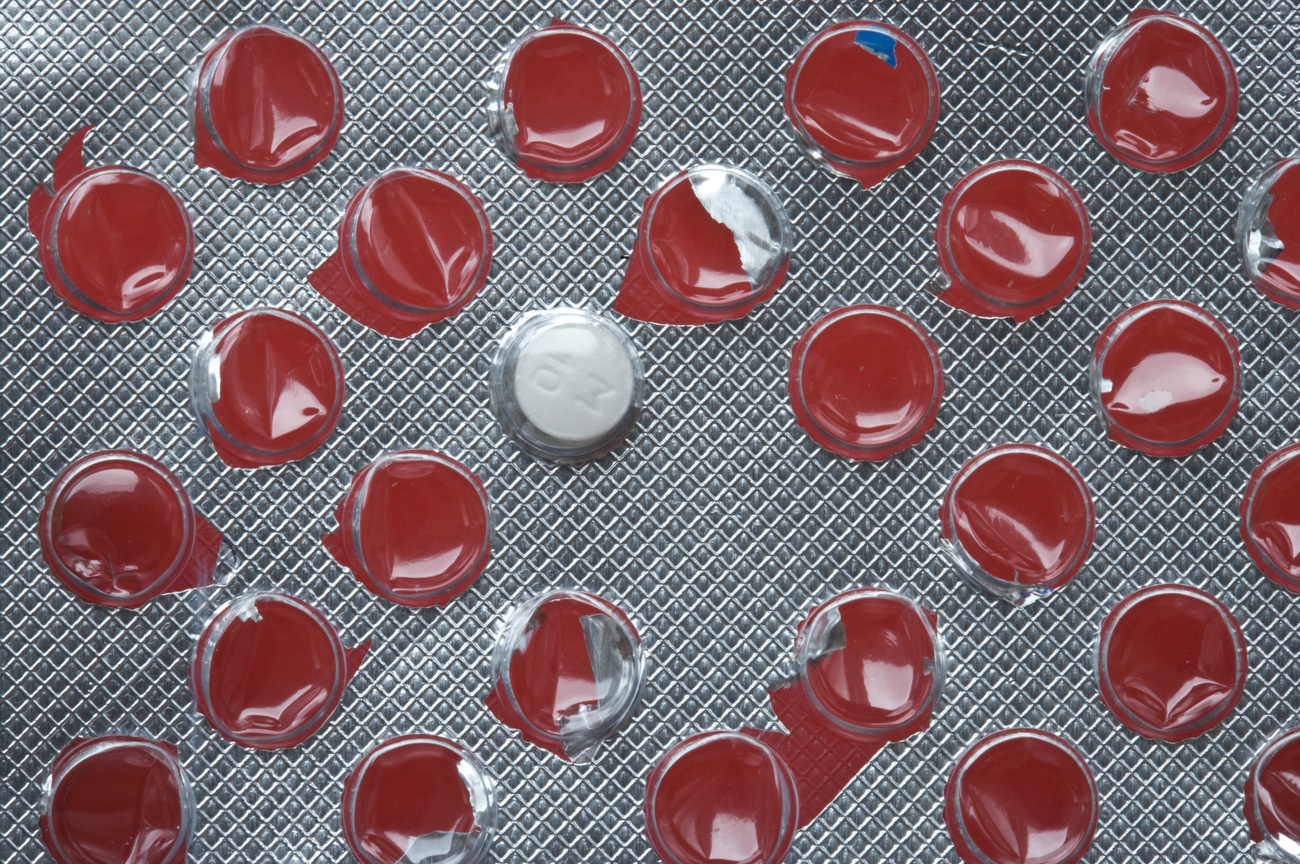
Swiss drugmakers face mixed fortunes amid Trump’s tariff upheaval

Pharma giants may escape the worst of the import tariffs threatened by US President Donald Trump as they cut drug prices and commit to invest billions in US manufacturing. But Switzerland’s smaller developers face a more uncertain future.
More pharma companies are expected to follow in the steps of American giant Pfizer and secure deals with the Trump administration to avoid trade tariffs of 100% on all patent-protected drugs entering the country. The president said the tax, which targets an array of medication from weight-loss to heart failure drugs, would go into force on October 1, but it has yet to be implemented.
Multinationals like AstraZeneca (United Kingdom) and Sanofi (France) grabbed headlines as they committed to invest in the US over the last few months. In Switzerland, Roche said it would invest $50 billion (CHF40 billion), while Novartis announced $23 billion over the next five years. Hundreds of Switzerland’s smaller drug developers and producers face a more precarious outlook.
“Larger companies have policy teams working on deals, and they do their own negotiations with the US government,” an adviser to smaller drug firms told Swissinfo, requesting anonymity to discuss an issue seen as highly sensitive in the industry. “It’s still not very clear how small and medium-sized firms will be impacted and the current assumption is that the same rules will apply to all of them.”

More
Timeline: How US President Trump upended the pharma industry in 2025
Switzerland has some 226 pharmaceutical manufacturing businesses, according to data compiled by IBISWorld, an online database and research providerExternal link, while the Swiss Biotech Association’s latest annual biotech report counted 324 biotech companiesExternal link active in research and development in 2024.
The Association of Pharmaceutical Companies in Switzerland (vips), an industry group representing smaller companies, has 101 members, of which 60 have an export licence, indicating they most likely trade with the US. The US is the world’s largest medicines market and accounts for 50-60% of the total exports of Swiss pharmaceuticals.
The Trump administration has been using the threat of tariffs to pressure companies into producing medicines in the US and lowering drug prices, which are the highest in the world, in a bid to “make America healthy again”.
American manufacturer Pfizer became the first company to announce a deal with the government, pledging on September 30 to bring drug prices down by aligning them to the levels paid by other developed countries, known as most-favoured-nation (MFN) prices. The agreement, and a commitment to invest $70 billion in US manufacturing, was enough to give Pfizer a three-year waiver from the 100% levies.
Although neither Roche nor Novartis has made any public comment about when they might announce deals, they are expected to do so in the near future.

More
Potential US tariff exemption for Swiss pharma is not necessarily a boon
“They’re all coming in over the next week. We’re making deals with all of them,” Trump said at the press conference announcing the Pfizer agreement. “And I said if we don’t make a deal, then we’re going to tariff them an extra, 5, 6, 7, 8%. Whatever the difference is, we’ll take that away.”
“In practical terms, the White House website never posted information about the entry into force of these tariffs,” a spokesperson for Interpharma, a lobby group representing 23 pharmaceutical companies in Switzerland, told Swissinfo. “We have had no other information than what was published on Trump’s social media and we don’t know how such tariffs would be imposed or on what products.”
Complex processes
The lack of information about the new tariff regime is creating uncertainty for many of Switzerland’s smaller pharmaceutical companies.
“For now, this is just an announcement, and we will only be able to take a specific position once the decree is available,” said vips director Ernst Niemack. Drug manufacturing is a highly complex process that is often carried out over several sites and the consequences of Trump’s policies will vary from company to company, he said.
Several scenarios exist to cover price hikes: international manufacturers that import products into the US absorb the costs, customers take the hit with higher prices, or American companies buying imported goods cover the expenses because they can’t find other manufacturing partners.

More
How pharma became Switzerland’s Achilles heel in US trade talks
“The key question here is: ‘Are there cheaper, equivalent competing products [to the Swiss ones] on the US market?’,” Niemack said.
Bachem, which is listed on the SIX Swiss Exchange, manufactures peptides and oligonucleotides, active pharmaceutical ingredients used in cancer treatments and RNA-based therapies. It already has manufacturing facilities in California and plans to increase production capacity in the US to “meet growing global demand” as well as expand in Switzerland.
“We produce highly complex active pharmaceutical ingredients,” a spokesperson told Swissinfo in an email. “Currently, there is insufficient global capacity for these substances. These are not consumer goods that can be easily substituted from one day to the next. Therefore, we believe that we will find suitable solutions together with our customers should tariffs be introduced.” Bachem didn’t comment on how it might be affected by tariffs.
Keeping a low profile
Smaller Swiss drugmakers that lack the scale to compete internationally – either by being part of specialised supply chains or by expanding their operations in the US – are keeping a low profile. Swissinfo reached out to over a dozen medium-sized Swiss pharma companies who export products to the US but heard back from only two.
“Companies currently don’t want to attract any unnecessary publicity,” said the adviser, who declined to be identified.

More
US tariffs pressure Swiss pharma powerhouse
In an effort to reduce the impact of tariffs, pharma companies with revenues of $1 billion to $2 billion are studying “creative” solutions to reduce the value of their exports to the US, he said.
Some are looking at the First Sale for Export rule as a short-term tool to reduce the base price declared to US customs. It allows importers to use a price charged at an earlier stage in the whole transaction chain as basis for the tariff rather than the final price the importer pays, thus reducing the taxable value of the product and the tariff burden.
Another scheme, the Non-Resident Importer, allows a foreign company to act as the official importer of record for goods entering the US, even without a physical presence there. While it doesn’t eliminate tariffs or make the trade domestic, it can simplify customs procedures and give the exporter more control over pricing and compliance.
But at the end of the day such schemes will make only a small dent in the additional burden of Trump’s import levies.
“Tariffs are only one side of the story, and what really matters for pharma companies is drug prices in the US,” the adviser said.
Developers of new and innovative medicines need to be able to achieve good profit margins on their drugs in order to ensure they have money to finance more research and development. If the tariffs sap demand for their products in the world’s biggest market, pharma companies may be constrained in developing new drugs.
“What will happen to research and development if pharma companies can’t make margins from US prices? This is going to lead to a very significant change” in their business models, he said.
What is your opinion? Join the debate:
Edited by Nerys Avery/bvw/ts

In compliance with the JTI standards
More: SWI swissinfo.ch certified by the Journalism Trust Initiative































You can find an overview of ongoing debates with our journalists here . Please join us!
If you want to start a conversation about a topic raised in this article or want to report factual errors, email us at english@swissinfo.ch.